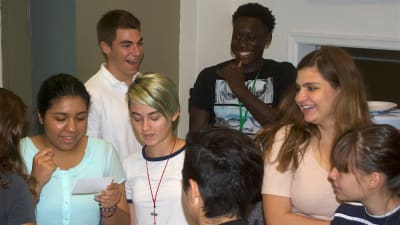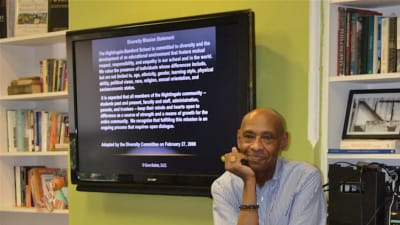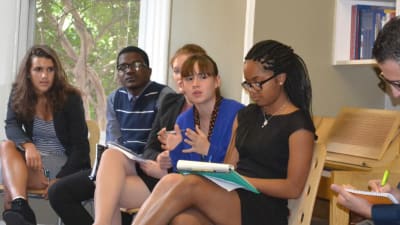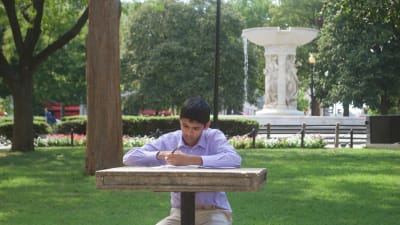Week One: Leading Syrian activist; top diversity expert visit SEGL
Week one of our Fall 2016 semester is complete, and our students are already leaving a positive impression.
This week we hosted our first two guest speakers during our “Introduction to Ethical Decision Making” case study. We will return to each guest’s topic many times over the course of the semester.
The Infamous Skittles Scenario begins our inaugural case study and is an early SEGL rite-of-passage. The simulation–a hands-on state-of-nature simulation that has students scurrying after plastic bags of candy and cackling with delight or dismay at 3×5 “Chance” cards–is an engaging introduction to ethical decision making. (What would you do, after all, if there were no rules and limited resources? Would you use that gun you found? Help out a suddenly-blind friend? Lie? Join a makeshift band of marauders? A sharing “collective” that might turn sour if resources are light?) The conversation that followed was fun and pensive.
We then gave the students an introduction to classic Western ethical theory–Aristotle, Kant, and John Stuart Mill–a 15 minute lecture that provides three important tools for their ethical decision making tool kit. (If you would like to see a seven-minute video of this lecture that was made for our online class several years ago, click here.)
Our first guest speaker was noted diversity and inclusion consultant Harold Eugene Batiste III, a founding SEGL trustee who has guided the National Association of Independent School’s diversity and inclusion initiatives and led the greater DC area’s association of independent schools. Now a sought-after speaker, he spoke with our students about the ethics of inclusion. What sort of community do our students want to form this semester? What words and actions might that require? Ought we to abide by a set of ground rules for discussion and debate, to help our words match our intent, or do such suggestions stifle speech? How should the school’s Mission influence these topics?
These questions will help students shape the community they live in for the next four months. They also highlight a key facet of the SEGL experience: as our students are learning about domestic and international challenges, they also face the challenge of living and working together. The SEGL experience–late night conversations, afternoon chores, collaborative projects–is itself a case study, and living intentionally will help make that experience meaningful.
Our next guest speaker is the first in a line of experts who will address the Syrian refugee crisis. The crisis connects to many current challenges: the balance of power in the Middle East (and around the world), the future of Europe (and the European Union), the U.S. Presidential election, and the humanitarian dilemma that threatens countless civilian lives. As is always the case, our students will meet speakers with competing viewpoints.
The first viewpoint we heard was from Deyaa Alrwishdi. Until the Syrian war began, Alrwishdi was a well-connected attorney working in the Syrian Defense Ministry. The war forced him to confront a difficult moral dilemma: a dilemma he asked our students to solve before telling his harrowing tale of joining the opposition, escaping Syria, and traveling to the United States, where he currently waits for his asylum application to be approved. (The tale was far more detailed and gripping than this brief overview, but all SEGL speakers join us “off the record” and we respect their wishes. Speak with a student if you would like to learn more!) He documents human rights abuses across Syria, and this year won Stanford University’s Rubin International Human Rights Award.
After he told his story, one student who had earlier attempted to answer his moral dilemma raised her hand and asked to amend her remarks. “I didn’t realize I could have chosen another path,” she said. This moment in many ways represents the essence of an SEGL education: we want to give our students the knowledge, confidence, and critical thinking tools so that as leaders, they never have to say, “I didn’t realize I could have chosen another path.”
Next week we study the 1994 Rwandan Genocide, one of the most impactful case studies of the semester.



















